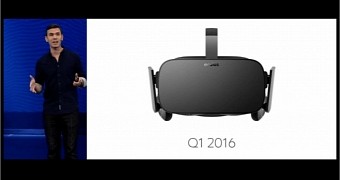During the Oculus Connect developer conference, VP Nate Mitchell has announced that the Oculus Rift will cost "at least $300 (€268)" and will sell bundled with an Xbox One Controller.
Typical of companies forcing the clients to jump on the hype train and needlessly pay money on bundled products just because of sheer excitement, Oculus made a deal with Microsoft and decided to start selling its Oculus Rift VR headset with an Xbox One Controller. Apparently, this is how you get the $300-plus price tag.
He also stated that the company didn't want to take the people's money as pre-orders but rather follow the Apple strategy of announcing the product first, leave it for pre-order the following week and barely in the third week after launch should the product be shipped.
The reason for that was "if you're going to hand me $300 today, I am not going to be excited to tell you: 'OK, in nine, 10, 12, 11 months, whatever it is, you're going to get something in return.' The longer you wait, the more you're like, 'This is obnoxious'" said Mitchell.
The Rift's Oculus Touch motion controllers aren't ready yet
According to Venture Beat, nothing has changed regarding the shipping dates, however. Oculus still plans to release the product's consumer version Q1 2016, together with an Xbox One Controller possibly as a stop-gap solution, until the Rift's Oculus Touch motion controller gets released in Q2 next year.
Although it's clear that the Oculus Touch controller isn't quite ready yet, the company claimed that this would better help them focus on the release of each product. Nevertheless, the coming months will probably be the history-making period in which the VR industry either goes big or goes bust, since multiple companies will try to catch up with Oculus and release their own versions of headsets dedicated to entertainment.
At the moment, the two main competitors are Oculus and Valve/HTC and both compete for the PC gaming market. It would be a shame if too many competitors will fragment the VR market since this would be a death blow to the entire industry. Multiple VR headsets for each VR game a customer would like to play would be too much for one's wallet.

 14 DAY TRIAL //
14 DAY TRIAL // 